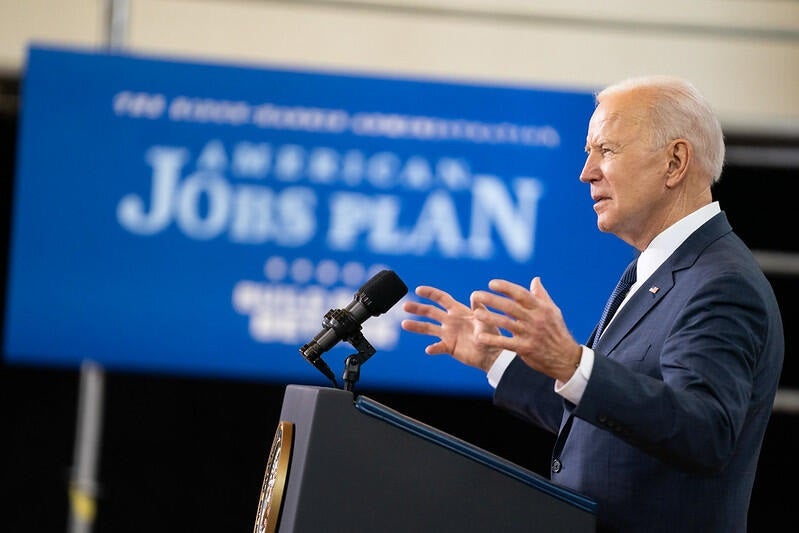
Washington and Wall Street must act now to protect Americans’ financial futures from unfolding climate change harms
This piece was co-authored by Stephanie Jones, Attorney, Climate Risk and Financial Regulations, and Gabe Malek, Project Manager, Investor Influence at EDF.
Climate change poses grave risks across society, including “more frequent and intense storms, wildfires, and heatwaves as well as more damaging droughts and more extensive ecosystem losses.” All people face climate harms, today: “this year alone, extreme weather has upended the U.S. economy and affected one in three Americans.” Policymakers must act with urgency to protect all Americans in the face of the unfolding climate crisis, and safeguarding peoples’ financial health and stability is urgent and paramount – no American should face financial jeopardy due to the harms climate change poses to their retirement account or ability to prudently manage personal and home finances.
Importantly, Washington and Wall Street are increasingly taking steps to recognize and manage climate risks. A number of important activities have taken shape in recently weeks, all designed to protect Americans’ financial futures. Measures range from proposed rules that would improve lifelong retirement savings plan selection to report findings that make transparent the harms climate change presents to the foundational stability of our banking system.
Eight of the most significant recent U.S. developments in the last few months of 2021 are highlighted below. It is crucial that we build upon these steps and take concrete, urgent action now to protect families, all people with bank accounts small and large, investors from main street to wall street, retirees, and all who depend on a financial system that is not destabilized by climate change.
- White House Releases Roadmap to Build a Climate-Resilient Economy. On October 14, the White House released its Roadmap to Build a Climate-Resilient Economy. The report finds that “climate change poses serious and systemic risks to the U.S. economy and financial system” and that “the country must work with urgency to reduce the risks of climate change by addressing its drivers and creating a stronger, more resilient economy.” The roadmap report lays out a whole-of-government strategy to protect Americans from increasing harms posed by climate change and to catalyze “public and private investment to seize the opportunity of a net-zero, clean energy future.”
- Department of Labor Proposes Rule Affirming Climate Considerations in Retirement Investing: On October 14, 2021, the Department of Labor issued a proposed rule making clear that fiduciaries can consider financial risks posed by climate change when making 401(k) investment decisions. The Department’s action is an important step to safeguarding Americans’ retirement plans from the harms presented by climate change and makes clear that environmental factors should be treated no differently from other forms of material risk-return factors.
- The Biden Administration Releases Over 20 Agency Climate Adaptation Plans: On October 7, 2021, the Biden Administration publicly released over 20 federal agency climate adaptation plans, which were prepared pursuant to the January Executive Order on Tackling the Climate Crisis at Home and Abroad. The plans were prepared by a range agencies, including the Departments of Defense, Energy, Agriculture, Labor, the Treasury and Housing and Urban Development. The plans outline each agency’s climate change vulnerabilities, with specific focus on facilities and operations, and set forth steps for adaptation and resilience implementation. Comments on the adaptation plans are due to the Council on Environmental Quality and Office of Management and Budget on November 6.
- Financial Stability Oversight Council Coordinates Climate Efforts Across Financial Regulators: On October 21, 2021, the Financial Stability Oversight Council – the governmental entity established to root out threats to the stability of the U.S. financial system – published a report declaring climate change “an emerging threat to the financial stability of the United States.” The report recommends actions to address the financial threats posed by climate change, including building agency capacity, improving data and methodology, enhancing public disclosures, and assessing and mitigating risks to stability. FSOC and its members must move swiftly to translate these grave findings into concrete agency action.
- Federal Acquisition Regulatory Council Explores Incorporating Climate Factors Into Government Purchasing Decisions: On October 15, 2021, member agencies of the Federal Acquisition Regulatory Council, which assists in the direction and coordination of government procurement, sought public input on how best to improve its rules to government purchasing decisions to incorporate considerations on greenhouse gas emissions and climate-related financial risk. The Office of Management and Budget stated, “[a]s the world’s single largest purchaser of goods and services, the Federal Government has an obligation to be a leader – especially when it comes to mitigating the impact of climate change in our supply chains.”
- Federal Reserve Announces Work on Climate Scenario Analysis: On October 7, 2021, Federal Reserve Governor Lael Brainard announced that the central bank is developing a scenario analysis approach to assess financial institutions’ exposure to climate-related risks, noting opportunities to learn from other jurisdictions and the technical challenges that remain. This announcement is important, as scenario analysis is a key tool employed by the Federal Reserve to uncover financial risks, assess the resilience of individual financial institutions, and determine the health of the financial system as a whole.
- Office of the Comptroller of the Currency Addresses Climate Risk in Its Bank Supervision Operating Plan: On October 15, 2021, the Office of the Comptroller of the Currency released its bank supervision operating plan for the 2022 fiscal year, which explicitly considers financial risks posed by climate change. The plan specifies that, for large banks, regulators should establish “a baseline understanding of the effects of physical and transition risks including the development of climate risk management frameworks and governance processes.”
- New York Federal Reserve Bank Develops Climate Stress Test Method: On September 24, 2021, the New York Federal Reserve Bank published a method for “test[ing] the resilience of financial institutions to climate-related risks,” developed jointly with scholars from the New York University Stern School of Business. The paper introduces a measure for systemic climate risk, and applies it to assess the “exposure of large global banks in the collapse of fossil-fuel prices in 2020.”
Like the U.S. federal government, other nations have been moving quickly to protect their financial systems from the risks posed by climate change. These include New Zealand’s recently passed “world-first” mandatory climate risk discourse regime, which will required the country’s largest corporate entities to “disclose clear, comparable and consistent information about the risks, and opportunities, climate change presents to their business,” and the European Central Bank’s economy-wide climate stress test, which assessed the financial resilience of euro area banks to climate change risks.
These worldwide efforts demonstrate the growing consensus that climate change poses grave risk to financial systems and national economies. Action by financial regulators to date is thus important and laudable, but more will be necessary to translate current activity into durable financial safeguards from risks posed by climate change. We look forward to engaging in those next steps, and helping to spur urgent activity and concrete action.












2 Comments
Brilliant article! I don’t see such articles any more these days. Well thought out and really well written. Couldn’t agree any further. Thank you for this.
As documented by the new scientific report by the Intergovernmental Panel on Climate Change (IPCC), we are all already besieged by a clear and present danger.
At the end of July, CNN’s Angela Dewan reflected on how the developed world in a short time has become part of the front line of the climate crisis. Within the span of a few weeks, temperatures in normally cool parts of Canada rose to up to 50 degrees Celsius. In the USA, 80 uncontrolled fires burned down areas ten times the size of Norway’s capital Oslo. In Germany, Belgium and Austria, heavy rains created floods that have killed hundreds of people and destroyed buildings and bridges that had lasted 100 years.
The next UN climate summit, COP26, will be held in Glasgow in November. The Paris Agreement is the framework for a future world in which global warming remains below a level we can tolerate. The path there, however, is both complicated and contentious. We can’t seem to agree on who should be responsible for what levels of emissions reductions, which measures to implement, the pace of change or how to finance it. https://www.buzzonearth.com/